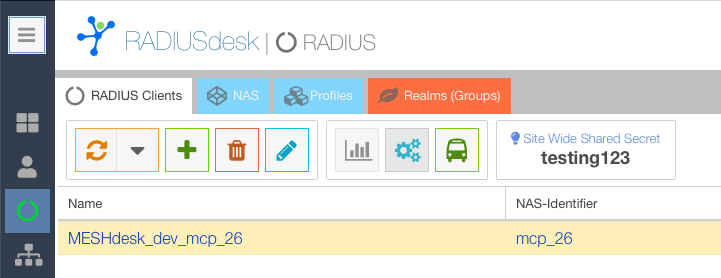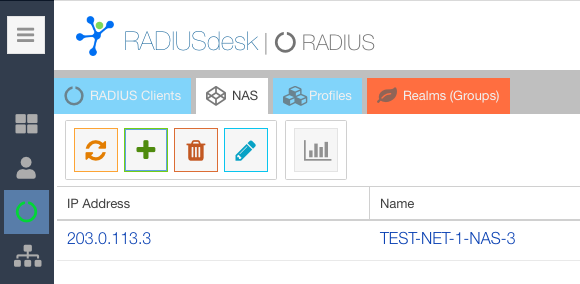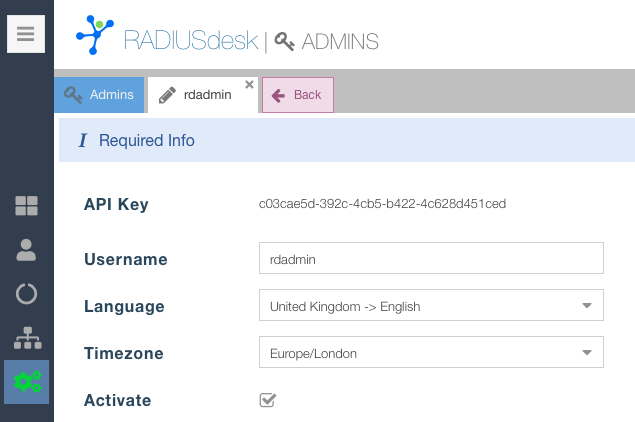This clause handles authentication and accounting using a
RADIUSdesk-compatible SQL database. The <AuthBy
RADIUSdeskSQL> module inherits parameters from
<AuthBy SQL>. <AuthBy
RADIUSdeskSQL> can be considered an extension of
<AuthBy FREERADIUSSQL>, offering additional
functionality and features. The following list highlights the enhancements
provided by <AuthBy RADIUSdeskSQL> compared to
<AuthBy FREERADIUSSQL>:
- User Profile Support
- If a User-Profile check attribute is specified for a user,
additional queries are performed to determine the user's profile.
- Account Disablement
- When a permanent user is disabled in RADIUSdesk, the
Rd-Account-Disabled check attribute is set, and
the module rejects the authentication request with the message
"Account Disabled".
- Gigaword Support
- Support for Acct-Input-Gigawords in accounting records.
- Realm Restrictions
- Support for Dynamic Client to Realm or NAS to Realm
restrictions.
- Auto-Registration
- Option to auto-register unknown users.
- Custom Attribute Recording
- Option to specify an attribute to be recorded during Access
Request and Accounting Start requests.
- Group Identification
- Option to specify a Group Name and Group ID per Radiator instance.
These values will be included with the SQL statement for the radacct
table used during Accounting Start. This feature is particularly
useful in large deployments with multiple Radiator instances where
database sharding is implemented.
For a configuration sample, see a configuration sample file
goodies/fidelio-hotspot.cfg
Background
Before diving into the configurable
parameters, it's essential to understand some key concepts in RADIUSdesk.
This background information will provide context and help you better
comprehend the parameters and their
applications.
Realms
In RADIUS, a realm is typically
specified as a suffix to a username, separated by a delimiter (e.g.,
jsmith@example.com, where "jsmith" is the username and
"example.com" is the realm). However, RADIUSdesk offers more
flexibility by allowing you to group users by realm without requiring the
realm component to be part of the username. This approach provides greater
freedom when defining usernames.
Dynamic Clients and
NAS
RADIUSdesk offers two methods for declaring RADIUS
clients.
1. Dynamic Clients
All Dynamic Clients have a
common shared secret and are identified by the
Nas-Identifier attribute of the incoming RADIUS
request. This is typically used for clients that contact the RADIUS server
from an unknown IP Address.

2.
NAS
Each NAS is identified by the IP Address and each
NAS can also have a unique shared secret. This is typically used for
clients that contact the RADIUS server from a known IP Address.

Restricting
Realms
RADIUSdesk enables realm restrictions for Dynamic Clients
and NAS entries. You can limit access to specific realms, ensuring that
users from unauthorized realms are denied network access. If a user who
belongs to a realm that is not included attempts to access the network,
the authentication request will be
rejected.
Profiles
RADIUSdesk has a Profile applet used
to manage user profiles. Each profile can contain multiple Profile
Components. A Profile Component consists of a number of check and reply
attributes. These attributes are selected from the dictionaries provided
by FreeRADIUS. Sometimes the dictionaries in FreeRADIUS are different
compared to the dictionary in Radiator. How to take care of this will be
covered later in the document with a practical example.
Password
Attribute
In recent FreeRADIUS releases, user passwords are
stored in the Cleartext-Password attribute. This is a change from older
releases, which used the User-Password attribute. RADIUSdesk follows the
same convention as recent FreeRADIUS releases, using Cleartext-Password
for storing user passwords.
Register Users
RADIUSdesk
provides a comprehensive API that mirrors the functionality of its web
GUI. With <AuthBy RADIUSdeskSQL>, you can
leverage this API to auto-register unknown users.
RADIUSdesk and Radiator Dictionary
Compatibility
RADIUSdesk utilizes FreeRADIUS dictionaries when
formulating Profile Components. However, differences may exist between
FreeRADIUS dictionary entries and those in Radiator.
Next will be a
couple of practical points on environments where Juniper BNGs are used as
RADIUS clients. For instance, the ERX dictionary used by Juniper equipment
(typically located at
/usr/share/freeradius/dictionary.erx) may have
discrepancies.
FreeRADIUS dictionary snippet:
VENDOR ERX 4874
BEGIN-VENDOR ERX
ATTRIBUTE ERX-Virtual-Router-Name 1 string
Radiator
dictionary snippet:
#
# Define additional Unisphere ERX Family Attributes
# based on http://www.juniper.net/techpubs/software/junos/junos114/
# radius-dictionary/unisphereDictionary_for_JUNOS__v11-4.dct
#
VENDOR ERX 4874
VENDORATTR 4874 Unisphere-Virtual-Router 1 string
Ensuring
Compatibility
Since Radiator queries the SQL database using
these values, it's crucial that Radiator can resolve the values from the
SQL database. To achieve compatibility, use RADIUSdesk's dictionary
override feature to align the FreeRADIUS dictionary with the Radiator
dictionary. For more information, see:
https://radiusdesk.com/wiki24/technical/fr-dictionary 
.
Disconnecting Active Sessions
RADIUSdesk's
latest version features a Packet of Disconnect (POD) functionality,
allowing you to send disconnect requests to BNG/RADIUS clients. This
feature is triggered by the following actions:
- Kicking an active session off using the "Kick User Off"
button.
- Disabling a permanent user with an active session.
- Changing the profile of a permanent user with an active
session.
The disconnect method used is determined by the Type option of a
Dynamic Client or NAS in RADIUSdesk, with the logic defined in
/var/www/rdcore/cake4/rd_cake/src/Controller/Component/KickerComponent.php
The Juniper type of equipment will typically require RADIUSdesk to
send a COA/POD to the BNG. The snippet below shows the code from
KickerComponent.php:
private function kickJuniperSession($ent){
// -- Sample Disconnect —
// echo "Acct-Session-ID='2040',User-Name='zaguy@example.com'" | radclient \
// -c '1' -n '3' -r '3' -t '3' -x '127.0.0.1:3799' 'disconnect' 'testing123'
$sessionid = $ent->acctsessionid;
$username = $ent->username;
$ip = $ent->nasipaddress;
$fwd_ip = $ip; // You can replace this with a central IP to forward it to
$secret = 'testing123';
shell_exec("echo \"Acct-Session-ID='$sessionid',User-Name='$username',
NAS-IP-Address='$ip'\" | radclient -c '1' -n '3'
-r '3' -t '3' -x '$fwd_ip:3799' 'disconnect' '$secret'");
}
AuthBy RADIUSdeskSQL configuration parameters
Having covered these key concepts, we can now explore the available
parameters for <AuthBy
RADIUSdeskSQL>.


